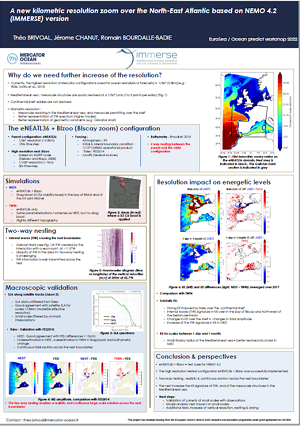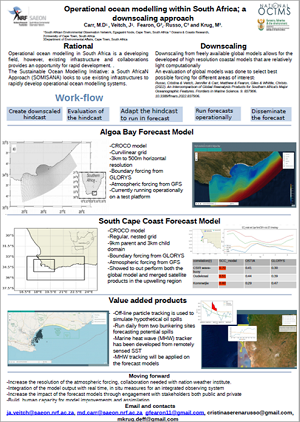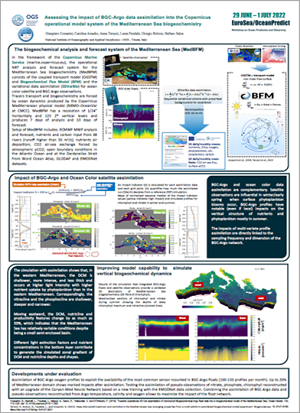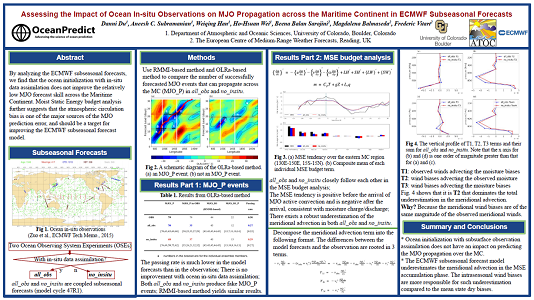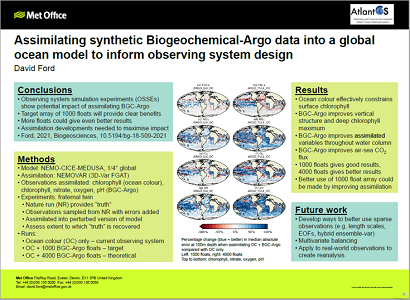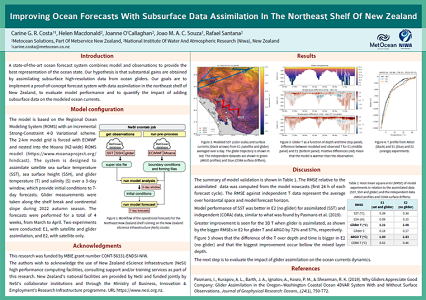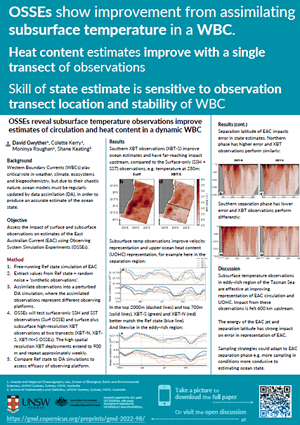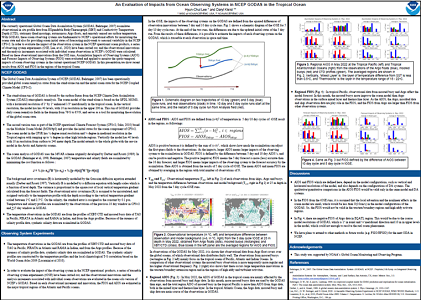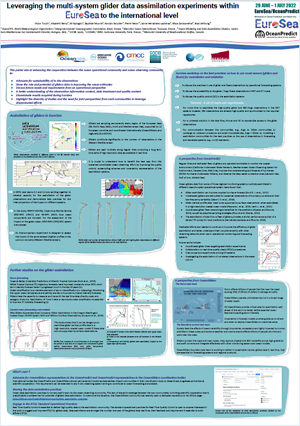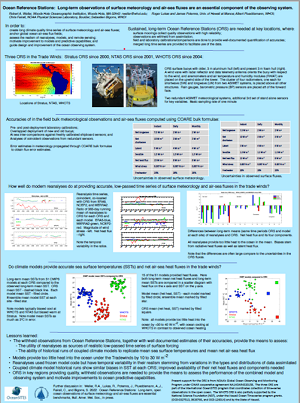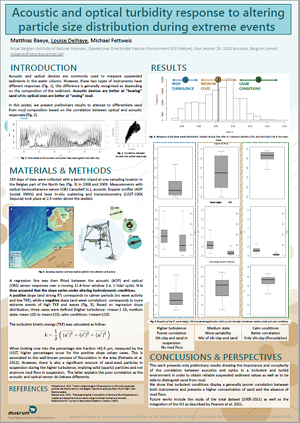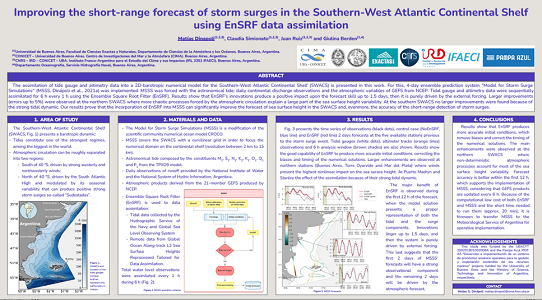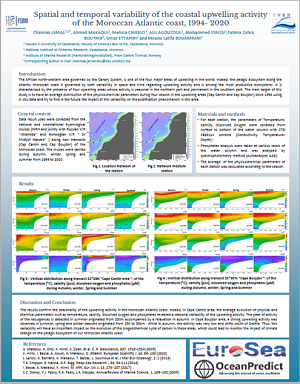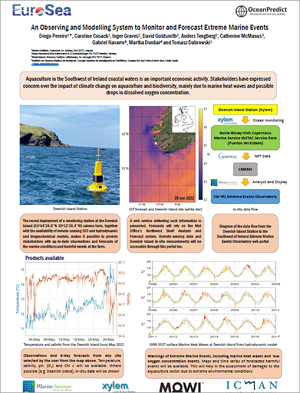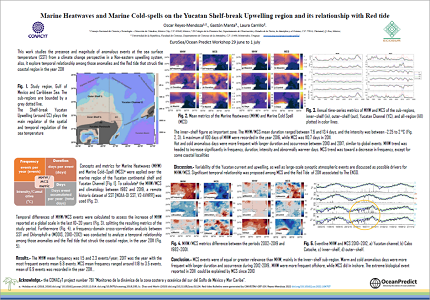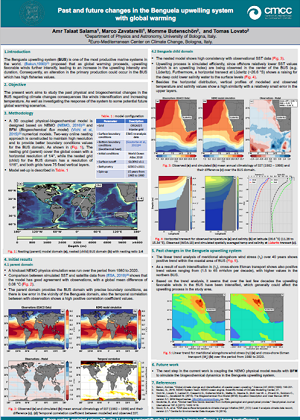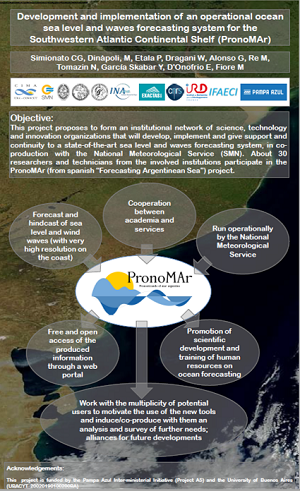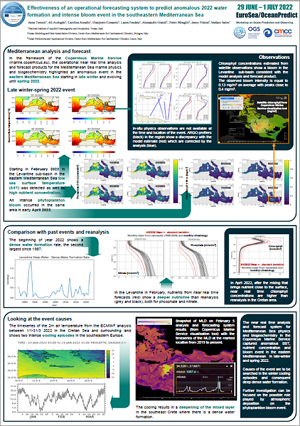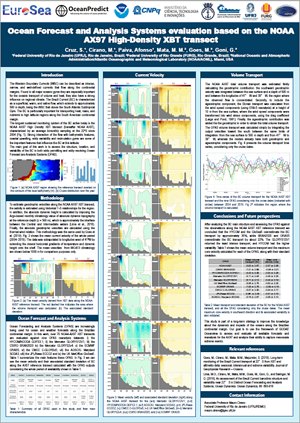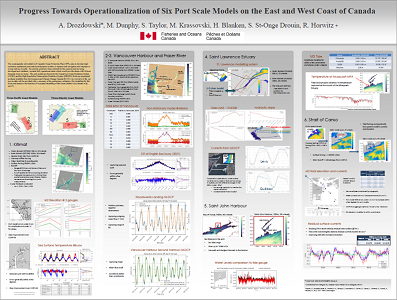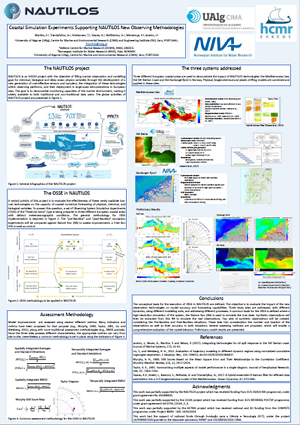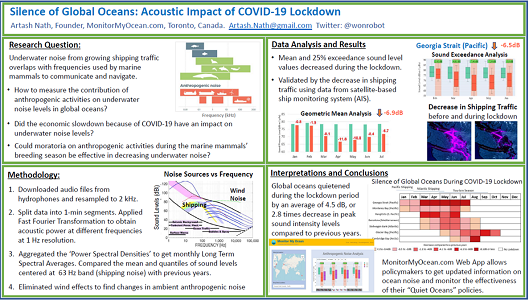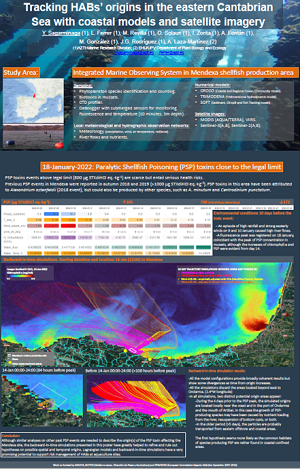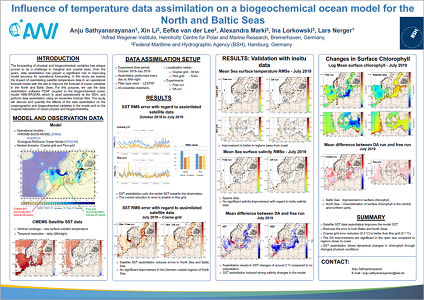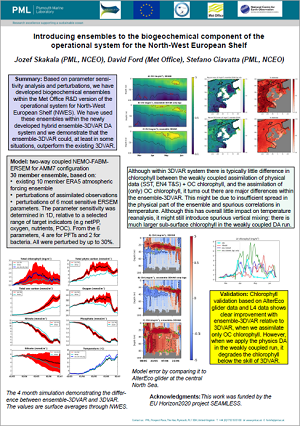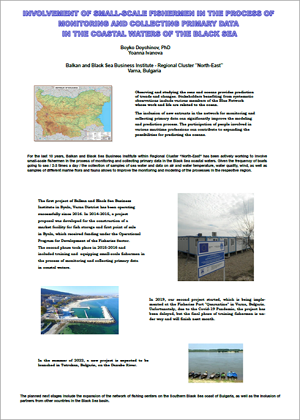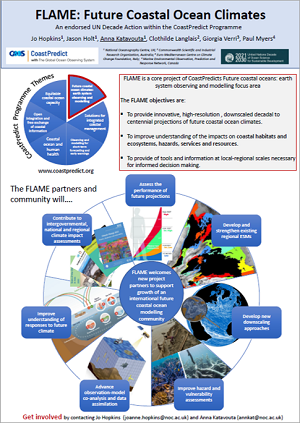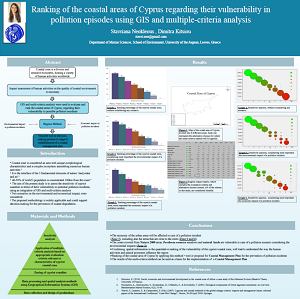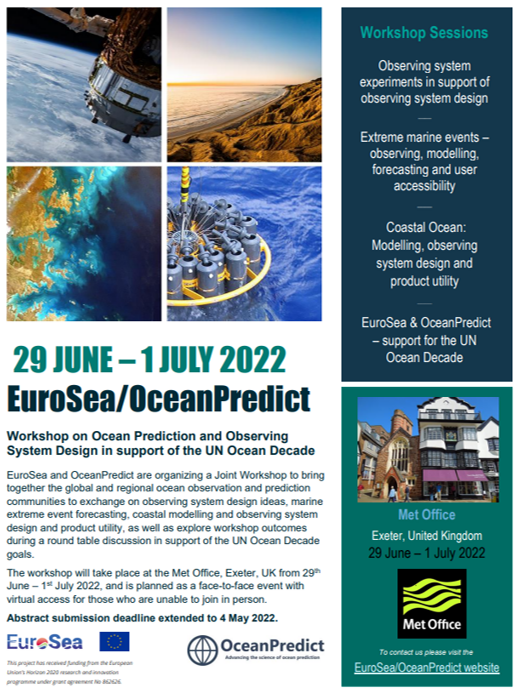EuroSea/OceanPredict Workshop-1, June 2022

This workshop is organised by OceanPredict and EuroSea “Improving and integrating the European Ocean Observing and Forecasting System”, funded through the European Commission research funding programme Horizon 2020. The workshop will link EuroSea with the international activities of OceanPredict through some of its specialised task teams, in support of connecting, exploring and advancing observation and ocean prediction efforts in a global context. Furthermore, the workshop is intended to contribute to the UN Decade initiative through interaction with Decade science programmes, GOOS and other science partners.
| Where: | Met Office, Exeter, UK |
| When: | 29 June – 1 July 2022 |
| Duration: | 3 days |
| Organisers: | Kirsten Wilmer-Becker (Met Office), Emma Heslop (GOOS/UNESCO), Ana-Lara Lopez (EuroGOOS), Caroline Cusack (Marine Institute), Angel Muniz Piniella (European Marine Board), Jay Pearlman (Four Bridges), Elisabeth Remy (MOI), Yosuke Fujii (JMA-MRI), Enrique Alvarez (Puertos del Estado), Giovanni Liguori (UniBo), Sabrina Speich (ENS), Matt Martin (Met Office), Stefano Ciavatta (PML) |
| Latest announcement: | Flyer – 08 April 2022 |
This workshop is organised by
OceanPredict and EuroSea with kind support from the Met Office, Exeter, UK
This project has received funding from the European Union’s Horizon 2020 research and innovation programme under grant agreement No 862626.
![]()
![]()
![]()
![]()
![]()
![]()
- 29 June – 1 July 2022 (Wed-Fri, 3-day event)
- Face-to-face event (with the option to join virtually)
- Open workshop
This workshop is organised by
OceanPredict and EuroSea with kind support from the Met Office, Exeter, UK
This project has received funding from the European Union’s Horizon 2020 research and innovation programme under grant agreement No 862626.
![]()
![]()
![]()
![]()
![]()
![]()
Please download the full agenda or view an agenda overview below (agenda version 26 June 2022).
Wed, 29 June 2022 – Day 1
Times give and local times (BST)
| Registration and Introduction | 8:00 – 9:30 | ||
| Session 1 presentations and discussion | 9:30 – 10:55 | 11:20 – 13:00 | 14:30 – 15:50 |
| Session 2 presentations | 16:26 – 17:25 | ||
| End of day 1 | 17:30 |
Thu, 30 June 2022 – Day 2
Times give and local times (BST)
| Session 2 presentations and discussion (contd.) | 9:00 – 10:50 | 11:20 – 12:20 | |
| Session 3 presentations and discussion | 12:20 – 13:05 | 14:00 – 15:40 | 16:10 – 17:30 |
| End of day 2 | 17:35 |
Fri, 1 July 2022 – Day 3
Times give and local times (BST)
| Session 4 presentations and discussion (contd.) | 9:00 – 10:15 | 10:45 – 11:25 |
| Round table discussion | 11:45 – 13:00 | |
| End of day 2 | 14:00 |
The workshop will cover four sessions featuring science presentations and posters with discussions. In addition, session 4 will include a round table discussion.
We are seeking submissions of abstracts for all sessions (oral and poster). The registration and abstract submission is now closed.
Session 1: OSEs & OSSEs in support of observing system design
Session 2: Extreme marine events – observing, modelling, forecasting and user accessibility
Session 3: Coastal Ocean: Modelling, observing system design and product utility
Session 4: EuroSea & OceanPredict – support for the UN Ocean Decade
This workshop is organised by
OceanPredict and EuroSea with kind support from the Met Office, Exeter, UK
This project has received funding from the European Union’s Horizon 2020 research and innovation programme under grant agreement No 862626.
![]()
![]()
![]()
![]()
![]()
![]()
Once the sessions have been held we will upload the session recordings here:
Wed, 29 June 2022 – Day 1
Times given are local times (BST)
Thu, 30 June 2022 – Day 2
Times given are local times (BST)
Wed, 1 July 2022 – Day 3
Times given are local times (BST)
Session 1 oral presentations
OSEs & OSSEs in support of observing system design
Session 2 oral presentations
Extreme marine events – observing, modelling, forecasting and user accessibility
Session 3 oral presentations
Coastal Ocean: Modelling, observing system design and product utility
Session 4 oral presentations
EuroSea & OceanPredict – support for the UN Ocean Decade
| No | First name | Surname | Affiliation | Title |
|---|---|---|---|---|
| 4.1 | Eric | Chassignet | Florida State University | ForeSea – The Ocean prediction Capacity of the Future |
| 4.2 | Giovanni | Coppini | CMCC | CoastPredict: Empowering coastal communities to address global challenges |
| 4.3 | Elisabeth | Remy | MOI | SynObs: a UN Decade project on Synergistic Observing Network for Ocean Prediction |
| 4.4 | Sabrina | Speich | ENS – PSL / IPSL | Ocean Observing Co-Design: Transforming our ocean observing system assessment and design process |
| 4.4 | Adèle | Révelard | SOCIB | Ocean integration: how can we improve coordination between observing activities? |
To view a poster and contact the author(s) use the links below. You will be able find the poster, view the poster image, the abstract and contact the authors by email. Some of the poster presenters will also be available by video conference / chat.
Posters: session 1 |
Posters: Session 2 |
Posters: Session 3 |
Posters: Session 4 |
Session 1 – OSEs & OSSEs in support of observing system design
ID: 1.1
A new kilometric resolution zoom over the North-East Atlantic based on NEMO 4.2 (IMMERSE) version
Authors: Théo Brivoal, Jérome Chanut
Affiliation: Mercator Ocean International
Abstract: Please click here
Contact the author by email: Théo Brivoal
ID: 1.2
Operational ocean modelling within South Africa; a downscaling approach
Authors: Carr, M1, Veitch, J1, Fearon, G2 and Russo, C1
Affiliation:
1 South African Environmental Observation Network (SAEON), South Africa
2 University of Cape Town (UCT), South Africa
Abstract: Please click here
Contact the author by email: Matthew Carr
ID: 1.3
Assessing the impact of BGC-Argo data assimilation into the Copernicus operational model system of the Mediterranean Sea biogeochemistry
Authors: Gianpiero Cossarini, Carolina Amadio, Anna Teruzzi, Laura Feudale, Giorgio Bolzon, Stefano Salon
Affiliation: Istituto Nazionale di Oceanografia e di Geofisica Sperimentale – OGS, Trieste, 34100, Italy
Abstract: Please click here
Contact the author by email: Gianpiero Cossarini
ID: 1.4
Assessing the Impact of Ocean In-situ Observations on MJO Propagation across the Maritime Continent in ECMWF Subseasonal Forecasts
Authors: Danni Du
Affiliation: University of Colorado, Boulder
Abstract: Please click here
Contact the author by email: Danni Du
ID: 1.5
Assimilating synthetic Biogeochemical-Argo and ocean colour observations into a global ocean model to inform observing system design
Authors: David Ford
Affiliation: Met Office, UK
Abstract: Please click here
Contact the author by email: David Ford
ID: 1.6
Improving ocean forecasts with subsurface data assimilation in the northeast shelf of New Zealand
Authors: Carine G. R. Costa1, Helen Macdonald2, Joanne O’Callaghan2, Joao M. A. C. Souza1, and Rafael Santana2
Affiliation:
1MetOcean Solutions, part of MetService New Zealand
2National Institute of Water and Atmospheric Research (NIWA), New Zealand
Abstract: Please click here
Contact the author by email: Carine G. R. Costa
ID: 1.7
OSSEs reveal subsurface temperature observations improve estimates of circulation and heat content in a dynamic WBC
Authors: David E. Gwyther1, Colette Kerry1, Moninya Roughan1, Shane R. Keating2
Affiliation:
1 Coastal and Regional Oceanography Lab, School of Biological, Earth and Environmental Sciences, UNSW Sydney, Sydney, NSW, Australia
2 School of Mathematics and Statistics, UNSW Sydney, Sydney, NSW, Australia
Abstract: Please click here
Contact the author by email: David E. Gwyther
ID: 1.8
An Evaluation of Impacts from Ocean Observing Systems in NCEP GODAS in the Tropical Ocean
Authors: Hyun-Chul Lee* and Daryl Kleist**
Affiliation: *IMSG at NOAA/NWS/NCEP/EMC
**NOAA/NWS/NCEP/EMC)
Abstract: Please click here
Contact the author by email: Hyun-Chul Lee
ID: 1.9
Leveraging the multi-system glider data assimilation experiments within EuroSea to the international level
Authors: Victor Turpin1, Elisabeth Remy2, Ali Aydogdu3, Romain Escudier2, Pierre Testor 4, Brad deYoung 5
Affiliation:
1 OceanOPS, World Meteorological Organization / Intergovernmental Oceanographic Commission, Brest, France
2 Mercator Ocean International, Toulouse, France
3 Ocean Modeling and Data Assimilation Division, Centro Euro-Mediterraneo Sui Cambiamenti Climatici, Bologna, Italy
4 LOCEAN / CNRS/LOCEAN, Sorbone University, Paris, France
5 Memorial University of Newfoundland, Halifax, Canada
Abstract: Please click here
Contact the author by email: Elisabeth Remy
ID: 1.10
Ocean Reference Stations: Long-term, open ocean observations of surface meteorology and air-sea fluxes are an essential component of the observing system
Authors: Robert A Weller*1, Roger Lukas2, James Potemra2, Albert. J. Plueddemann1, Chris Fairall3, Sebastien Bigorre1
Affiliation:
1 Woods Hole Oceanographic Institution, Woods Hole MA, 02543
2 University of Hawaii at Manoa, Honolulu, HI 96822
3 NOAA Physical Sciences Laboratory, Boulder, CO 80305
Abstract: Please click here
Contact the author by email: Robert A Weller
Session 2: Extreme marine events – observing, modelling, forecasting and user accessibility
ID: 2.1
Acoustic and optical turbidity response to altering particle size distribution during extreme events
Authors: Matthias Baeye, Louise Delhaye, Michael Fettweis
Affiliation: Royal Belgian Institute of Natural Sciences (RBINS)
Operational Directorate Natural Environment (OD Nature)
Rue Vautier 29 / B-1000 Brussels / Belgium
Abstract: Please click here
Contact the author by email: Matthias Baeye and Louise Delhaye
ID: 2.2
Improving the short-range forecast of storm surges in the Southern-West Atlantic Continental Shelf using EnSRF data assimilation
Authors: Dinápoli M. G.* 1,2,3, Simionato C. G.1,2,3,4
Affiliation:
1 Universidad de Buenos Aires, Facultad de Ciencias Exactas y Naturales (FCEN), Buenos Aires, Argentina
2 CONICET – Universidad de Buenos Aires. Centro de Investigaciones del Mar y la Atmósfera (CIMA). Buenos Aires, Argentina
3 CNRS – IRD – CONICET – UBA. Instituto Franco-Argentino para el Estudio del Clima y sus Impactos (IRL 3351 IFAECI). Buenos Aires, Argentina
4 Departamento de Ciencias de la Atmósfera y los Océanos, FCEN, Universidad de Buenos Aires, Argentina
2 University of Cape Town (UCT), South Africa
Abstract: Please click here
Contact the author by email: Matias G. Dinápoli
ID: 2.3
Spatial and temporal variability of the coastal upwelling activity of the Moroccan Atlantic coast, 1994- 2020
Authors: Chaimaa JAMAL1-2*, Ahmed MAKAOUI2, Melissa CHIERICI3, Aziz AGOUZOUK2, Mohammed IDRISSI2, Fatima Zohra BOUTHIR2, Omar ETTAHIRI2 and Mouna Latifa BOUAMRANI1
Affiliation:
1 Hassan II University of Casablanca, Faculty of Sciences Ben M’Sik, Casablanca, Morocco
2 National Institute for Fisheries Research, Casablanca, Morocco
3 Institute of Marine Research (Havforskningsinstituttet), Fram Centre Tromsø, Norway
Abstract: Please click here
Contact the author by email: Chaimaa Jamal
ID: 2.4
An observing and modelling system to monitor and forecast extreme marine events
Authors: Diego Pereiro1*, Caroline Cusack1, Inger Graves2, David Goldsmith2, Anders Tengberg2, Catherine McManus3, Gabriel Navarro4, Martha Dunbar4 and Tomasz Dabrowski1
Affiliation:
1Marine Institute, Oranmore, Co. Galway, H91 R673, Ireland
2 Xylem-Aanderaa Data Instruments A/S, Sanddalsringen 5b, 5225 Nesttun, Norway
3 Mowi Ireland, Rinmore, Ballylar, Letterkenny, Co. Donegal, F92 T677, Ireland
4 Instituto de Ciencias Marinas de Andalucía, Consejo Superior de Investigaciones Científicas, Campus Río San Pedro, Puerto Real, Cádiz, Spain
Abstract: Please click here
Contact the author by email: Diego Pereiro
ID: 2.5
Marine Heatwaves and Marine Cold-spells on the Yucatan Shelf-break Upwelling region and its relationship with Red tide
Authors: Oscar Reyes−Mendoza1,2, Gastón Manta3, Laura Carrillo2
Affiliation:
1 Consejo Nacional de Ciencia y Tecnología – Dirección de Cátedras, México City, C.P. 03940, México
2 El Colegio de la Frontera Sur, Departamento de Observación y Estudio de la Tierra, la Atmósfera y el Océano, C.P. 77014, Chetumal, Q. Roo, México
3 Universidad de la República, Facultad de Ciencias, Departamento de Ciencias de la Atmósfera, C.P. 11400, Montevideo, Uruguay
Abstract: Please click here
Contact the author by email: Oscar Reyes−Mendoza
ID: 2.6
Past and future changes in the Benguela upwelling system with global warming
Authors: Amr Talaat Salama1, Marco Zavatarelli1, Momme Butenschön2, and Tomas Lovato2
Affiliation:
1Department of Physics and Astronomy, University of Bologna, Bologna, 40127, Italy
2Euro-Mediterranean Center on Climate Change, Bologna, 40127, Italy
Abstract: Please click here
Contact the author by email: Amr Talaat Salama
ID: 2.7
Development and implementation of an operational ocean sea level and waves forecasting system at the Southwestern Atlantic Continental Shelf
Authors: Simionato CG1,2,3, Dinápoli, M1,2,3, Etala P4, Dragani W2,5,6, Re M7, Tomazin N7, García Skabar Y4, D’Onofrio E8, Fiore M6
Affiliation:
1 Center for Oceanic and Atmospheric Research (CIMA/CONICET-UBA), Buenos Aires, Argentina
2 Department of Atmospheric and Oceanic Sciences (DCAO/FCEN-UBA), Buenos Aires, Argentina
3 International Research Laboratory French-Argentinean Institute for the Study of Climate and its
Impacts (IRL IFAECI/CNRS-IRD-CONICET-UBA), Buenos Aires, Argentina
4 National Meteorological Service (SMN/MINDEF), Buenos Aires, Argentina
5 National Council for Scientific and Technical Research (CONICET), Buenos Aires, Argentina
6 Hydrographic Service (SHN/MINDEF), Buenos Aires, Argentina
7 National Water Institute (INA), Buenos Aires, Argentina
8 Institute of Geodesy and Applied Geophysics (IGGA/FIUBA-UBA), Buenos Aires, Argentina
Abstract: Please click here
Contact the author by email: Claudia G Simionato
ID: 2.8
Effectiveness of an operational forecasting system to predict anomalous 2022 water formation and intense bloom event in the southeastern Mediterranean Sea
Authors: Anna Teruzzi1, Ali Aydogdu2, Carolina Amadio1, Gianpiero Cossarini1, Laura Feudale1, Alessandro Grandi3, Pietro Miraglio2, Jenny Pistoia2, Stefano Salon1
Affiliation:
1National Institute of Applied Oceanography and Geophysics, Trieste, Italy
2Ocean Modeling and Data Assimilation Division, Centro Euro-Mediterraneo Sui Cambiamenti Climatici, Bologna, Italy
3Ocean Predictions and Applications Division, Centro Euro-Mediterraneo Sui Cambiamenti Climatici, Lecce, Italy
Abstract: Please click here
Contact the author by email: Anna Teruzzi
Session 3: Coastal Ocean: Modelling, observing system design and product utility
| ID | Authors/affiliation | Title |
|---|---|---|
| 3.1 | Samantha Cruz, UFRI | Ocean Forecast and Analysis Systems evaluation based on the NOAA AX97 High-Density XBT transect |
| 3.2 | Adam Drozdowski, DFO | Progress towards operationalization of six port scale models on the east and west coast of Canada |
| 3.3 | Flávio Martins, University of Algarve | Coastal Simulation Experiments Supporting NAUTILOS New Observing Methodologies |
| 3.4 | Artash Nath, Monitor My Ocean | Monitoring Underwater Anthropogenic Noise Levels in Global Oceans: Using COVID-19 Lockdown as Baseline |
| 3.5 | Yolanda Sagarminaga, ATZI | Tracking HABs’ origins in the eastern Cantabrian Sea with coastal models and satellite imagery |
| 3.6 | Anju Sathyanarayanan, AWI | Influence of data assimilation on a biogeochemical ocean model for the North and Baltic Seas |
| 3.7 | Jozef Skalala, PML | Introducing ensembles to the biogeochemical component of the operational system for the North-West European Shelf |
ID: 3.1
Ocean Forecast and Analysis Systems evaluation based on the NOAA AX97 High-Density XBT transect
Authors: Cruz, S. B. O.¹, Cirano, M.¹, Paiva, A. M.¹, Mata, M. M.², Goes, M.³, Goni, G.³
Affiliation:
1 Federal University of Rio de Janeiro (UFRJ), Rio de Janeiro, Brazil
2 Federal University of Rio Grande (FURG), Rio Grande, Brazil
3 National Oceanic and Atmospheric Administration/Atlantic Oceanographic and Meteorological Laboratory (NOAA/AOML), Miami, USA
Abstract: Please click here
Contact the author by email: Mauro Cirano and Samantha Cruz
ID: 3.2
Progress towards operationalization of six port scale models on the east and west coast of Canada
Authors: A Drozdowski, M. Dunphy, S. Taylor, M. Krassovski, H. Blanken, S. St-Onge Drouin, R. Horwitz
Affiliation: Fisheries and Oceans Canada
Abstract: Please click here
Contact the author by email: Adam Drozdowski
ID: 3.3
Coastal Simulation Experiments Supporting NAUTILOS New Observing Methodologies
Authors: Martins, F. 1, Triantafyllou, G. 2, Kristiansen, T. 3, Tsiaras, K. 2, Eleftheriou, G.2, Mendonça, F.4, Janeiro, J.4
Affiliation:
1University of Algarve (UAlg), Centre for Marine and Environmental Research (CIMA) and Engineering Institute (ISE), Faro, PORTUGAL
2Hellenic Centre for Marine Research (HCMR), Attiki, GREECE
3 Norwegian Institute for Water Research (NIVA), Oslo, NORWAY
4 University of Algarve (UAlg), Centre for Marine and Environmental Research (CIMA), Faro, PORTUGAL
Abstract: Please click here
Contact the author by email: Flavio Martins
ID: 3.4
Monitoring Underwater Anthropogenic Noise Levels in Global Oceans: Using COVID-19 Lockdown as Baseline
Authors: Artash Nath
Affiliation: Founder, MonitorMyOcean.com
Abstract: Please click here
Contact the author by email: Artash Nath
ID: 3.5
Tracking HABs’ origins in the eastern Cantabrian Sea with coastal models and satellite imagery
Authors: Y. Sagarminaga1, L. Ferrer1, M. Revilla1, O. Solaun1, I. Zorita1, A. Fontán1, M. González1, J.G. Rodriguez1, A. Laza-Martínez2
Affiliation:
1 AZTI- Marine research Division
2 EHU-UPV- Department of Plant Biology and Ecology
Abstract: Please click here
Contact the author by email: Yolanda Sagarminaga
ID: 3.6
Influence of data assimilation on a biogeochemical ocean model for the North and Baltic Seas
Authors: Anju Sathyanarayanan1, Xin Li2, Eefke van der Lee2, Alexandra Marki2, Ina Lorkowski2, Lars Nerger1
Affiliation:
1Alfred Wegener Institute, Helmholtz Centre for Polar and Marine Research, Bremerhaven, Germany.
2Federal Maritime and Hydrographic Agency (BSH), Hamburg, Germany.
Abstract: Please click here
Contact the author by email: Anju Sathyanarayanan
ID: 3.7
Introducing ensembles to the biogeochemical component of the operational system for the North-West European Shelf
Authors: Jozef Skalala
Affiliation: PML
Abstract: Please click here
Contact the author by email: Jozef Skalala
Session 4: EuroSea & OceanPredict – support for the UN Ocean Decade
| ID | Author/affiliation | Title |
|---|---|---|
| 4.1 | Boyko Doychinov, Balkan and Black Sea Business Institute | INVOLVEMENT OF SMALL-SCALE FISHERMEN IN THE PROCESS OF MONITORING AND COLLECTING PRIMARY DATA IN THE COASTAL WATERS OF THE BLACK SEA |
| 4.2 | Anna Katavouta, NOC | FLAME: Future Coastal Ocean Climates |
| 4.3 | Stavriana Neokleous, University of the Aegean | Ranking of the coastal areas of Cyprus regarding their vulnerability in pollution episodes using GIS and multiple-criteria analysis |
ID: 4.1
Involvement of small-scale fishermen in the process of monitoring and collecting primary data in the coastal waters of the Black Sea
Authors: Boyko Doychinov, PhD, Yoanna Ivanova
Affiliation: Balkan and Black Sea Business Institute within Regional Cluster “North-East” Varna, Bulgaria
Abstract : Please click here
Contact the author by email: Boyko Doychinov
ID: 4.2
FLAME: Future Coastal Ocean Climates
Authors: Jo Hopkins and Jason Holt
Presenter: Anna Katavouta
Affiliation: National Oceanography Centre, UK with project partners
Euro-Mediterranean Centre on Climate Change Foundation, Italy (CMCC)
Commonwealth Scientific and Industrial Research Organisation (CSIRO), Australia
Marine Environmental Observation, Prediction and Response Network (MEOPAR), Canada
Abstract: Please click here
Contact the author by email: Jo Hopkins and Anna Katavouta
ID: 4.3
Ranking of the coastal areas of Cyprus regarding their vulnerability in pollution episodes using GIS and multiple-criteria analysis
Authors: Stavriana Neokleous and Dimitra Kitsiou
Affiliation: Laboratory of Environmental Quality and Geospatial Applications, Dept. of Marine Sciences, University of the Aegean, 81100 Mytilene, Greece
Abstract: Please click here
Contact the author by email: Stavriana Neokleous
You can register and submit an abstract(s) for the EuroSea/OceanPredict workshop by completing the Registration and abstract submission form (link below). If you only want to register but not submit an abstract, just leave the respective submission form part blank.
| Abstract submission deadline | Closed |
| Registration deadline | Closed |
Registration fees
The registration to the event is free.
Access to Met Office
All attendees will be required to present a valid ID to Met Office Reception Desk staff to be able to receive a name badge and enter the workshop conference rooms. Before the event all in-person attendees will be invited to a security check (by email).
Invitation letters
If attendees require invitation letters they should contact the OP programme office.
Abstracts + presentations online
We plan to make all submitted abstracts and presentations (oral or poster) available on the OP website. If you want to withhold your abstract/presentation from the website, you will be able to state this in the abstract submission form.
Poster presentations/format
Posters should be provided in A0 format (841 x 1189 mm), portrait. Poster boards and fixings will be provided at the workshop.
This workshop is organised by
OceanPredict and EuroSea with kind support from the Met Office, Exeter, UK
This project has received funding from the European Union’s Horizon 2020 research and innovation programme under grant agreement No 862626.
![]()
![]()
![]()
![]()
![]()
![]()
The EuroSea/ OceanPredict workshop will take place at the Met Office which is located to the east of Exeter, Devon, UK.
Please view the Met Office “Find us” page to find out about travel information of how to get to the Met Office.
Travel information
Coming to the Met Office
Exeter airport is located less than 5 miles from the Met Office, but has only limited connections to international airports.
Bristol Airport is the next larger airport to Exeter with several international flight connections. There is an airlink bus called the Falcon which operated between Exeter (Stop is is called “Exeter, Honiton Road P&R”) and Bristol airport, The bus stop is directly outside the Met Office grounds. The journey time is just under 2 hours. Bus tickets can be booked only 4 weeks in advance or directly from the driver at £9.80 for a one-way trip.
London airports present the major connection to international locations. The best connection represents Heathrow as it provides a convenient train connection to London (Paddington station) and further on to the South West and Exeter. Travel times from Heathrow via London to Exeter by train are ca 3-4 hours. An alternative to the train is a bus connection (National Express) to Exeter, which, depending on the connection can take 3.5 – 5 hours.
Accommodation in Exeter
There are a few hotels in walking distance from the Met Office:
Most hotels are located near Exeter city centre. Please check booking.com. There is a direct P&R bus connection between the Met Office and the city centre. The bus ride takes about 15-17 min and cost £3.00 one-way. The connection is operating between 7am and 19:30pm (24/7).
Covid regulation in the UK
The UK is open for visitors and has eased it’s Covid regulation. Travellers now…
- do not need to complete a UK passenger locator form before they travel
- do not need to take any COVID-19 tests before you travel or after they arrive
- do not need to quarantine when they arrive
This applies whether a person is vaccinated or not.
More information can be found on the official travel info website at:
Travel to England from another country during coronavirus (COVID-19) – GOV.UK (www.gov.uk)
This workshop is organised by
OceanPredict and EuroSea with kind support from the Met Office, Exeter, UK
This project has received funding from the European Union’s Horizon 2020 research and innovation programme under grant agreement No 862626.
![]()
![]()
![]()
![]()
![]()
![]()
Executive summary
The main objective of the EuroSea/OceanPredict workshop was to strengthen the linkages of the EuroSea community with the leading edge of global forecast and prediction through representative of the OceanPredict community and other international research efforts. This was achieved by setting up a workshop that allowed focus on a specific set of sessions, exploring observation and ocean prediction efforts in a global context, discussing issues and developing recommendations for solutions. Furthermore, the workshop highlighted the UN Decade of Ocean Science current programmes’ initiatives for the “Predicted Ocean”, which showed the importance of global efforts for the improvement and advancement of the observing system and prediction system capabilities.
The workshop sessions (see Sessions below) culminated in the round table discussion. Outcomes from the four workshop sessions were collated and passed on as questions to the round table panel, summarised under the topics: Ocean Observations, Sustainability, Essential Ocean Variables, Ocean Prediction and Ocean Best Practice. The recommendations from the round table discussion highlighted the
- need for better communication and closer collaboration of the observation and prediction communities, the
- importance to involving intermediate and end-users in questions of ocean observations, the
- consideration of a fully integrated ocean observing system (including all regions and observation types), the
- plan to create a fully ocean information value-chain (from user needs, to observations, data assembly and distribution, ocean prediction and services to user and societal benefits) and the
- value of defining and describing all processes involved in operational oceanography through ocean best practice methodology.
With over 150 participants in total, the overall workshop participation was higher than expected and despite Covid-19 almost 40 people joined the workshop in person. This added a lot of positive energy at the event and provided a good backdrop for strong engagement and valuable discussions. Although Covid-19 is generally limiting the number of in-person attendees, the advance in remote/hybrid meeting technology is providing improved opportunities for new communities to join the discussion. New research groups and initiatives from South America and Asia have joined and their contribution were welcomed.
EUROSEA / OCEANPREDICT FULL REPORT
